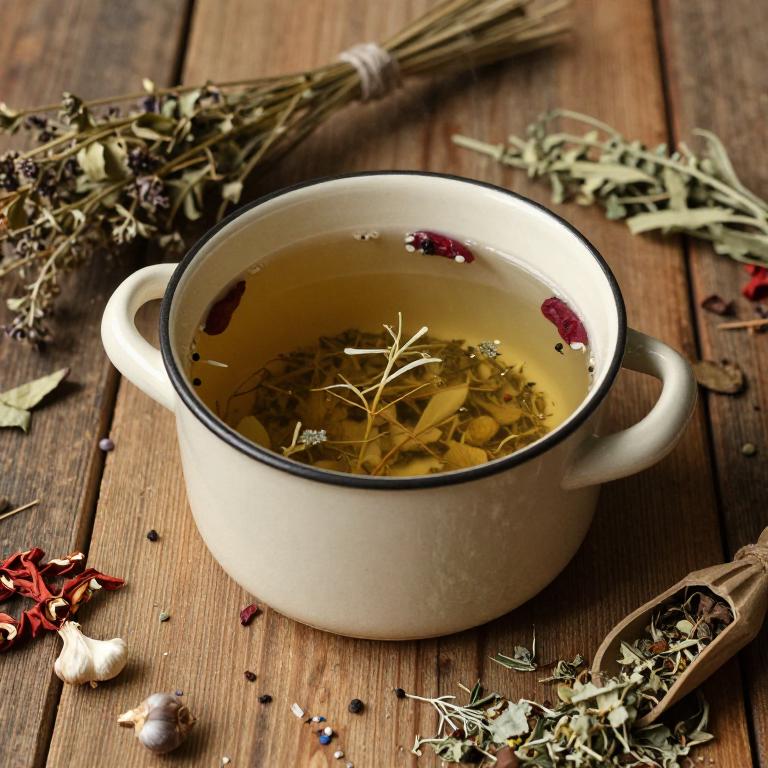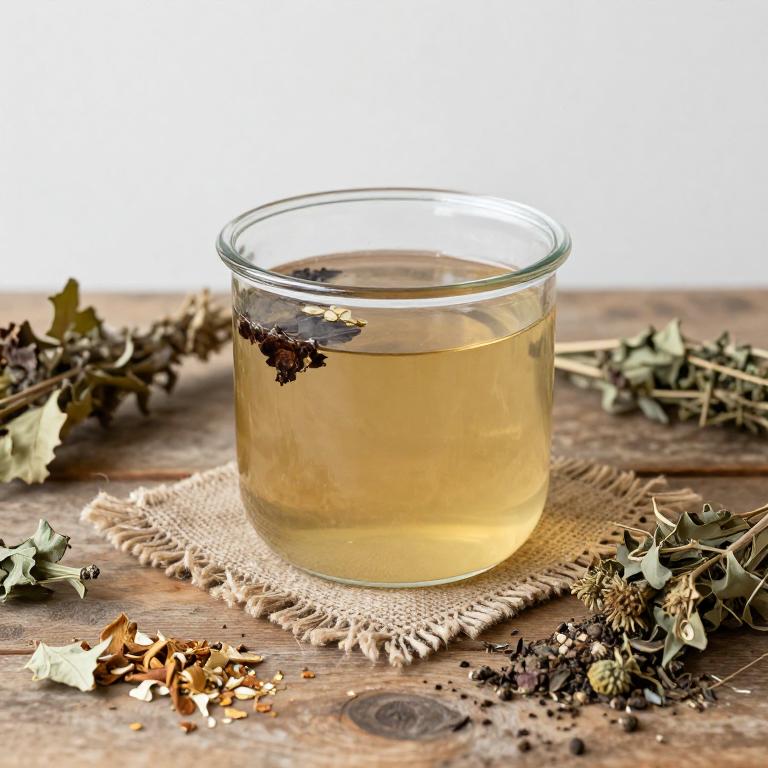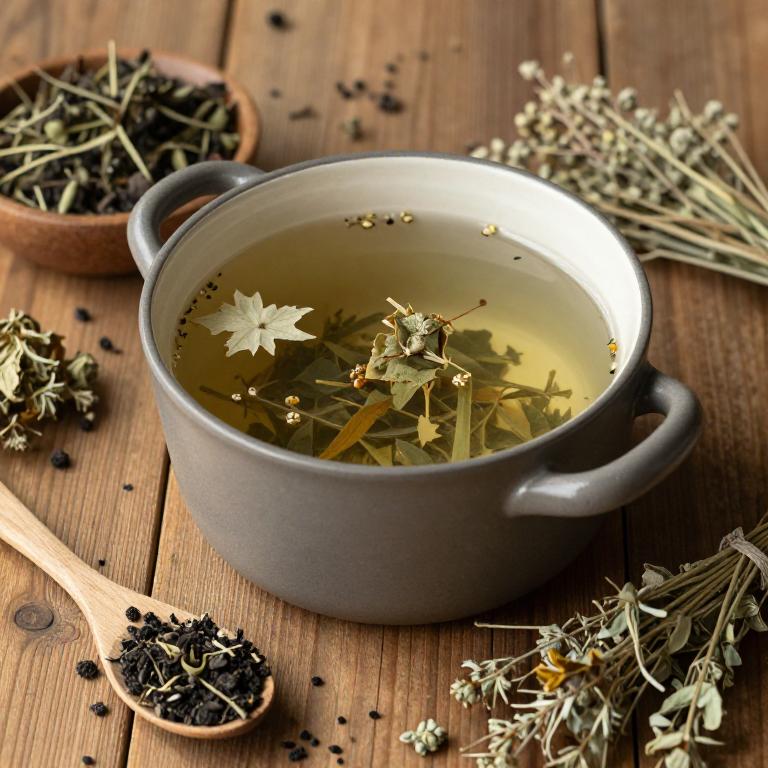10 Best Herbal Decoctions For Gerd

Herbal decoctions have been traditionally used to alleviate symptoms of gastroesophageal reflux disease (GERD) by soothing the digestive system and reducing acid production.
Commonly used herbs include licorice root, ginger, and chamomile, which are known for their anti-inflammatory and antacid properties. These decoctions are typically prepared by simmering the dried herbs in water for an extended period to extract their active compounds. While they may offer some relief, they should not replace medical treatment for severe GERD.
It is advisable to consult a healthcare professional before incorporating herbal remedies into a treatment plan.
Table of Contents
- 1. Chamomile (Matricaria chamomilla)
- 2. Ginger (Zingiber officinale)
- 3. Thistle (Silybum marianum)
- 4. Licorice (Glycyrrhiza glabra)
- 5. Fennel (Foeniculum vulgare)
- 6. Dog rose (Rosa canina)
- 7. Cumin (Cuminum cyminum)
- 8. Common grape (Vitis vinifera)
- 9. Yarrow (Achillea millefolium)
- 10. Stinging nettle (Urtica dioica)
1. Chamomile (Matricaria chamomilla)

Matricaria chamomilla, commonly known as German chamomile, has been traditionally used for its calming and anti-inflammatory properties.
Herbal decoctions made from chamomile flowers are often recommended for individuals suffering from gastroesophageal reflux disease (GERD) due to their potential to soothe the digestive tract and reduce inflammation. The active compounds in chamomile, such as flavonoids and essential oils, may help relax the lower esophageal sphincter and decrease gastric acid secretion. Studies suggest that chamomile decoctions can alleviate symptoms like heartburn and indigestion in some GERD patients.
However, it is important to consult with a healthcare provider before using chamomile, as it may interact with certain medications or have side effects in some individuals.
2. Ginger (Zingiber officinale)

Zingiber officinale, commonly known as ginger, has been traditionally used for its medicinal properties, including its potential benefits for gastrointestinal health.
Herbal decoctions made from fresh or dried ginger root are often prepared by simmering the root in water to extract its active compounds, such as gingerol and shogaol. These compounds are believed to possess anti-inflammatory and antiemetic properties that may help alleviate symptoms of gastroesophageal reflux disease (GERD), such as heartburn and indigestion. Some studies suggest that ginger can help reduce stomach acidity and improve digestion, making it a popular complementary therapy for individuals with GERD.
However, it is important to consult a healthcare professional before using ginger decoctions, especially for those with existing medical conditions or taking medications.
3. Thistle (Silybum marianum)

Silybum marianum, commonly known as milk thistle, has been traditionally used for its potential hepatoprotective properties, and some studies suggest it may also aid in managing gastroesophageal reflux disease (GERD).
Herbal decoctions made from the seeds of Silybum marianum are often prepared by simmering the dried seeds in water to extract the active compounds, such as silymarin. These decoctions are believed to support digestive health by reducing inflammation and strengthening the lining of the stomach and esophagus. However, while some anecdotal evidence supports its use for GERD, more clinical research is needed to confirm its efficacy and safety.
As with any herbal remedy, it is advisable to consult a healthcare provider before using Silybum marianum, especially for individuals with preexisting medical conditions or those taking other medications.
4. Licorice (Glycyrrhiza glabra)

Glycyrrhiza glabra, commonly known as licorice root, has been traditionally used in herbal medicine for its potential therapeutic effects on gastrointestinal conditions, including gastroesophageal reflux disease (GERD).
The herbal decoction of licorice root is believed to exert anti-inflammatory and mucoprotective properties, which may help reduce esophageal irritation and soothe the lining of the stomach and esophagus. Studies suggest that the active compounds in licorice, such as glycyrrhizin and flavonoids, can inhibit the production of stomach acid and enhance the protective barrier of the gastric mucosa. However, prolonged use of licorice root decoctions may lead to side effects like hypertension and fluid retention due to its mineralocorticoid-like effects.
Therefore, it is advisable to consult a healthcare professional before using licorice root as a complementary therapy for GERD.
5. Fennel (Foeniculum vulgare)

Foeniculum vulgare, commonly known as fennel, has been traditionally used in herbal medicine for its soothing properties, particularly in the treatment of gastrointestinal issues such as gastroesophageal reflux disease (GERD).
Herbal decoctions made from the seeds of fennel are often prepared by simmering them in water to extract their essential oils and active compounds, which include anethol and fenchone. These compounds are believed to help reduce stomach acidity and relax the lower esophageal sphincter, thereby alleviating symptoms like heartburn and regurgitation. Fennel decoctions are typically consumed in small quantities several times a day, often after meals, to provide a calming effect on the digestive system.
While generally considered safe, individuals with allergies to the carrot family should exercise caution, and it is advisable to consult a healthcare provider before using fennel as a treatment for GERD.
6. Dog rose (Rosa canina)

Rosa canina, commonly known as rosehip, has been traditionally used in herbal medicine for its potential benefits in managing gastrointestinal conditions such as gastroesophageal reflux disease (GERD).
The decoctions made from the dried fruits of Rosa canina are rich in bioactive compounds, including polyphenols, flavonoids, and vitamin C, which may help reduce inflammation and support digestive health. Studies suggest that these herbal decoctions may help alleviate symptoms of GERD by strengthening the lower esophageal sphincter and reducing stomach acid production. However, it is important to consult with a healthcare professional before using rosehip decoctions, as they may interact with certain medications or have side effects in some individuals.
Overall, Rosa canina herbal decoctions can be a complementary therapy for GERD when used under proper guidance.
7. Cumin (Cuminum cyminum)

Cuminum cyminum, commonly known as cumin, has been traditionally used in herbal medicine for its potential digestive benefits.
When prepared as a herbal decoction, cumin can help soothe the gastrointestinal tract and may reduce symptoms associated with gastroesophageal reflux disease (GERD). The active compounds in cumin, such as cuminaldehyde and thymol, possess anti-inflammatory and carminative properties that may aid in alleviating heartburn and indigestion. To prepare a cumin decoction, the seeds are typically simmered in water for several minutes, then strained and consumed warm.
While some studies suggest cumin may offer relief for GERD symptoms, it is advisable to consult a healthcare professional before using it as a treatment, especially if other medical conditions or medications are involved.
8. Common grape (Vitis vinifera)

Vitis vinifera, commonly known as the common grapevine, has been traditionally used in herbal medicine for its potential therapeutic effects on gastrointestinal conditions such as gastroesophageal reflux disease (GERD).
Herbal decoctions made from the seeds or leaves of Vitis vinifera are believed to possess antioxidant, anti-inflammatory, and mucoprotective properties that may help reduce symptoms of GERD. These decoctions are often prepared by boiling the dried parts of the plant in water to extract bioactive compounds like resveratrol and flavonoids. Some studies suggest that these compounds may support the healing of the esophageal lining and improve gastric motility, thereby alleviating heartburn and reflux.
However, more clinical research is needed to fully establish the efficacy and safety of Vitis vinifera decoctions as a complementary therapy for GERD.
9. Yarrow (Achillea millefolium)

Achillea millefolium, commonly known as yarrow, has been traditionally used in herbal medicine for its anti-inflammatory and digestive properties.
When prepared as a decoction, it may help alleviate symptoms of gastroesophageal reflux disease (GERD) by reducing stomach acid production and soothing the lining of the esophagus. The decoction is typically made by simmering dried yarrow herb in water for about 15 to 20 minutes, then straining and consuming it in small doses throughout the day. Some studies suggest that its compounds, such as azulene and essential oils, may contribute to its effectiveness in managing digestive discomfort.
However, it is important to consult with a healthcare provider before using yarrow decoctions, especially for individuals with existing health conditions or those taking medications.
10. Stinging nettle (Urtica dioica)

Urtica dioica, commonly known as stinging nettle, has been traditionally used in herbal medicine for its potential anti-inflammatory and soothing properties.
When prepared as a decoction, the leaves and stems of Urtica dioica are simmered in water to extract their beneficial compounds, including flavonoids and minerals. This herbal decoction may help alleviate symptoms of gastroesophageal reflux disease (GERD) by reducing inflammation in the gastrointestinal tract and supporting digestive health. Some studies suggest that the plant’s mucilage content may form a protective layer over the esophagus, potentially minimizing acid irritation.
However, while anecdotal evidence supports its use, more clinical research is needed to confirm its efficacy and safety for GERD management.